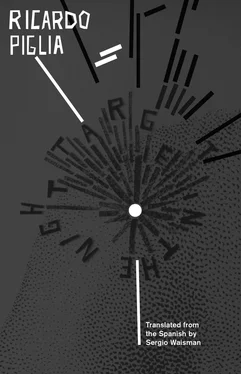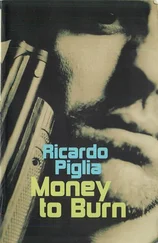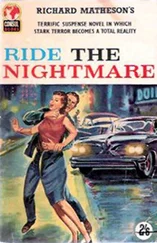Sofía was silent for a while, watching the afternoon light waning in the garden, then resumed the somewhat maddened rhythm of the story she had heard and repeated, or imagined, many times before.
“My father made himself out to be an aristocrat. That’s why he sought out my mother, for her family name. She’s an Ibarguren,” Sofía said. “My father married for love the first time around, with Regina O’Connor, but as I was saying before, she left him for another. My father never recovered, he couldn’t conceive of anyone abandoning him or treating him with contempt. Deep down he always doubted if my brother was really his, he treated him with extreme deference, like one would a bastard. And also, unlike my brother Lucio, my brother Luca was always hostile, and this hostility became a kind of demonic pride, an absolute conviction, because when his mother abandoned them and left town, my father rescued him, and brought him back, and since then he’s lived with us, at home.”
Renzi stood up.
“What do you mean, where did he rescue him from?”
“He brought him home and raised him, he didn’t care where he came from.”
“And the theater director? Was he the father, the possible father?” Renzi asked.
“It doesn’t matter, because his mother always said that Luca was my father’s son, that you could tell a mile away. Unfortunately, he’s your father’s son, Regina used to say, you can tell right away because he’s so forlorn, and a lunatic. If he wasn’t his son, he wouldn’t have gotten into the situation he’s in now, his mother said, just about killing himself, ruining his life over an obsession.”
“What is this, a melodrama?” Renzi asked.
“Of course, what did you expect? They brought him home and raised him like the rest of us, and he never saw his mother again. She finally moved back to Dublin, she lives there now and doesn’t want anything more to do with us, or with this place, or her sons. The Irishwoman. My father still has a photograph of her on his desk. That woman, she was out of place here, can you imagine? She was too standoffish to be an Argentine mother, she could ride a horse better than any gaucho, but she hated the country out here. ‘What kind of shit do these shits think?’ she used to say. She blamed the countryside for everything, the infinite tedium of the countryside, people wandering down the empty streets of the small town like the walking dead. Nature only produces destruction and chaos, it isolates people, every gaucho is a Robinson Crusoe riding on a horse like a shadow. Isolated thoughts, solitary, light as baling wire, heavy as a bag of maize, no one can get out, everyone’s tied to the deserted fields, they head out on horseback to inspect their property, to see if the fence posts are in good shape, if the animals have stayed near the watering spring, if the storm’s coming — and in the late afternoon, by the time they come back home, they’ve been made dumb by the boredom and the emptiness. My brother says he can still hear her curse at night, that sometimes he speaks with her, that he always sees her. She couldn’t have stayed in this town, the Irishwoman. When she ran away, pregnant, my father made life impossible for her, he wouldn’t let her see her other son, by court order, everyone consented to punishing her. He wouldn’t let her see Lucio, she would send messages, presents, she would plead, she’d come to the house, but my father would have servants throw her out. Sometimes he’d tell her to wait in the square and he’d pass slowly by in the car so she could see her son, little Lucio looking at her through the window without waving, his eyes full of surprise.” Sofía paused, and smoked pensively. “She was pregnant with Luca (two hearts beating in one body, thump thump) and Lucio looking at her through the rear window of the car, can you picture it? Finally she left the kids and went back to her own country.”
She’s putting me on, Renzi thought, she’s spinning a yarn to hook me in.
“When she finally escaped forever from this damned country, as she used to call it, she went back to Dublin, where she works now as a teacher. Every once in a while we get a letter, always addressed to her sons, written in a Spanish that gets stranger and stranger with time. No one has ever written back to her. Because her two sons have not forgiven her for abandoning them, and this served to unite them under a common sorrow. No son can forgive his mother for abandoning him. Fathers abandon their sons without any problems, they just leave and never see them again, but a woman can’t do that, it’s forbidden, that’s why my sister and I, if we ever have children, we’re going to abandon them. And they’ll wave at us, standing in a square when they’re small, the little kids, while we drive by in our cars with a different lover. How do you like that?”
She stopped, looked at Renzi with a smile glowing in her eyes, and served herself more wine. Then she went back to the living room and took a while. When she came back out, she was exhilarated, her eyes were shining, she was rubbing her tongue over her gums and balancing two plates with cheese and olives.
“In my family the men go crazy when they become fathers. Look at what happened to my old man: he could never get out from under his doubt. He was certain only of the paternity of my older brother, Lucio, he was the only one who obeyed his desires, except in his marriage.”
Only then did Renzi realize that Sofía was going inside more and more frequently. He followed her into the living room and saw her bent over a glass table.
“What do you have there?” Renzi asked.
“Sea salt,” she said, leaning forward, smiling, holding a rolled-up, one-peso bill to her nose.
“Well, well, will you look at the country girl,” Renzi said. “Can I have a line?”

15 “There are bogus societies that transport 30,000 tons of grain under the table per month. That is equivalent to 3,000 trucks. Just ten or twelve people can run such an operation. ‘Some juridical reports charge $30,000 to create such a society,’ several sources stated to this reporter” (Renzi’s article).
Bravo and Renzi left the newspaper offices and walked down the empty streets of the town. It was a stormy night; a warm wind was blowing from the plains. Renzi realized with disgust that he had stepped on a beetle, which made a dry crack as he crushed it under his shoe. Clouds of mosquitoes and moths flitted about the corner streetlights. After a while, a stray dog appeared in front of them, slightly deformed, its tail between its legs. A bit lame, it began to follow them with its crooked walk.
“That’s the Inspector’s dog, he leaves him untied and the mutt roams about all over town at night like a ghost.”
The dog stayed close for a while, but finally lay down at a doorstep along the way. The two men walked on, the wind rustling the branches in the trees and raising the dust in the street.
“Here we are, Emilio,” Brazo said. “This is the Club.”
They stood in front of a two-story house, French style but understated. A bronze plaque announced to anyone who went close enough to read the miniscule print that this was the Social Club, founded in 1910.
“Not just anyone can come in here,” Bravo said. “But you’re with me, you can be my guest tonight.
“My work as the society page reporter consists of setting a high bar and keeping people on one side separate from those on the other side. My readers can’t come in here, so they have to read the paper. How to cross the line; or better yet, how to make the jump from one side to the other, that’s what everyone wants to know. Durán, the deceased, a mulatto, a black man really — because out in the province there are no mulattos, you’re either white or you’re black. Anyway, Durán, black and all, was finally able to go in.”
Читать дальше













